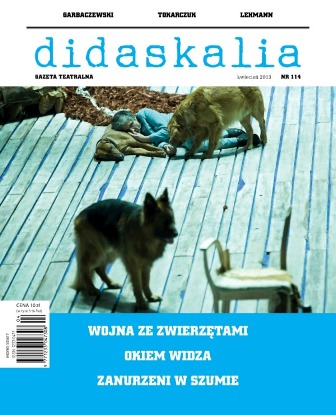
Oddać głos naukowcom. Z Marcinem Cecko rozmawia Karolina Wycisk
Dramatist Marcin Cecko speaks about his work on the Poznań premiere of Balladyna (the Polish Theatre in Poznań, prem: 25 I 2013) – in particular, about what prompted him to “rewrite” Juliusz Słowacki’s play, his inspirations while writing the script and the process which led him to change his script and conception for the production. Cecko raises the issues of posthumanism and biopolitics and also attempts to grapple with the Romantic paradigm. Balladyna represents a turning point in Cecko and Krzysztof Garbaczewski’s collaborative activities – up until now, both of them have rarely spoken out about political issues.
More...